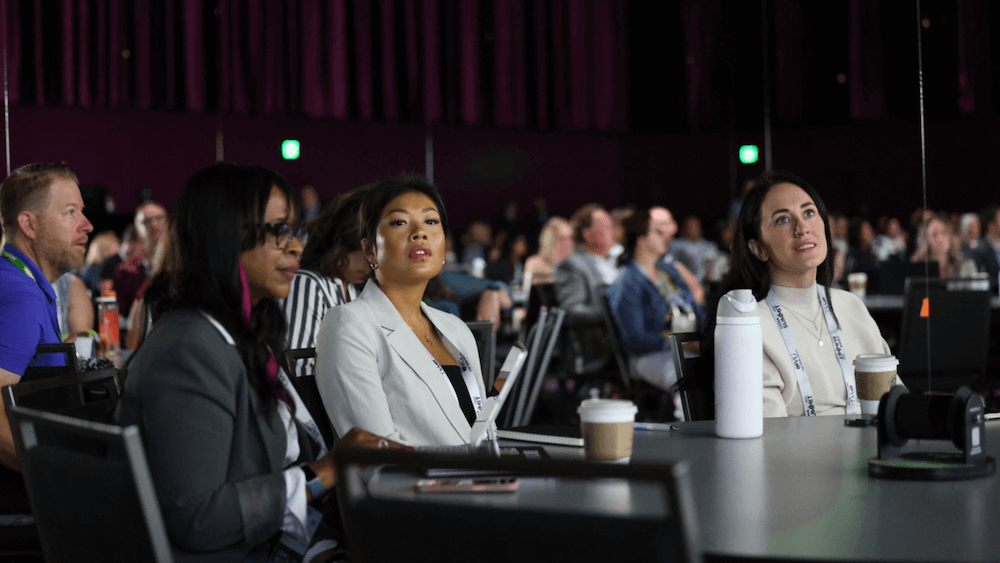


CEMA Summit 2025 will mark the 35th anniversary of the event, which brings together event marketing leaders for three days of education, workshops, discussions, and more.
Over the past few years, we’ve learned to embrace AI to streamline our workloads, whether it’s taking notes for us during a meeting or quickly collating and deciphering data. But according to organizational psychologist David Burkus, who earned a doctorate in strategic leadership, it can serve a much higher purpose — like pave the way to greater collaboration, innovation, and even empathy for teams.
David Burkus
This is what Burkus will explore in his Main Stage keynote session at CEMA Summit, “Build an Event Marketing Dream Team with Humans & AI.” Burkus, who frequently consults on how to build better teams for companies like PepsiCo and Adobe, says that right now, workers typically fall into one of three camps when it comes to AI: They see it as a threat (“AI will take my job”), they see it as a tool (using it for research and writing emails) — or they see it as a teammate, which he said can shift teams into a higher level of collaboration.
When you view AI simply as a tool, Burkus said, “you end up treading water, you’ll be doing more with less. You’ll be simplifying processes, but you won’t really be making a lot of new progress or creating new value compared to the third approach that teams take, which is that they see it as … someone to actually collaborate with, to partner with, to ask for advice on, especially to see perspectives they may not have.”
The former Oral Roberts University professor — who has authored five books on business and leadership — shared some specific examples during a recent conversation with Convene. Say your team is tasked with brainstorming big ideas for your next event. That process, he said, can be challenging because “you need people willing to submit crazy ideas, but you also need people willing to push back and challenge each other, and it’s really hard to do that, person-to-person.”
AI, however, can serve in that uncomfortable role as an impartial contrarian. “Very few people get offended when Claude or ChatGPT point out the flaws in their idea,” he said. How to do that exactly? Prompt your AI tool of choice to “tell me three ways this idea could fall apart.” Or take it a step further and ask it to imagine what the competition might do: “Let’s say I plan a user conference for a payroll software company,” Burkus said. After describing the event to AI, prompt it to identify “what our biggest competitor would do to one-up us … and it’ll throw out a bunch of ideas. Not all of them will be great, but I guarantee you there’ll be ones you didn’t think of.”
‘Points of Frustration’
Gaining clarity and even empathy into others’ roles and responsibilities is another high-level hurdle where AI can help eliminate silos within teams — a common pain point, especially in the world of organizing events.
“You’ve got all these different people with all of these different preferences and norms of what’s standard in their industry that all have to come together in this cross-functional team to make a great event work,” Burkus said. He points to a lack of understanding around these differences as to why we so frequently experience frustrations cross-functionally.
Thinking about how AI can extract insights during specific pain points can help. For example, instead of just emailing your team an AI-generated transcript of a recent meeting, ask AI to identify and clarify decisions made, next steps, and more. “Here’s a moment where you could either circle everybody back or you could ask the tool, ‘Okay, hey, based on everything we’ve talked about, what did we commit to in this meeting? What are the actual takeaways?” Burkus said.
Some newer and under-development AI programs are even capable of assisting managers to coach their teams — and ultimately create more empathy between them, Burkus said. “Picture a normal meeting notetaker like Fathom or Otter, but in addition to just information, it can point out [things] like, ‘Hey, Jen mentioned this two or three times and you didn’t pick up on it,” he said. “There may be a point of frustration here with her. You might want to check in with her on that.’”
Zooming out, one of the biggest challenges Burkus sees when it comes to creating successful teams is a lack of shared understanding — which he describes as the ability to grasp your own role and responsibility as well as the roles and responsibilities of the rest of the organization. He attributes this to companies and organizations progressively growing larger and more fragmented, especially among remote teams. “We’re missing a lot of the things that created informal networks inside an organization that really helped [with] that shared understanding,” he said. And “the thing we need to realize is as we go forward into how work is getting done now, we’re going to need to do something to replace that level of shared understanding that used to happen by accident.”
And that’s where AI offers an opportunity. “I see it as a tool for recapturing enough time to be able to do those things,” he said. “I very rarely meet a knowledge worker who says they have enough hours in the day. Well, if we can get those back, then maybe we can use that spare time to do the very things we need to do to feel more connected as a team.”
Jennifer N. Dienst is senior editor at Convene.
Learn more about David Burkus’ keynote session, “Build an Event Marketing Dream Team with Humans & AI,” at CEMA Summit, July 27–29, 2025.








